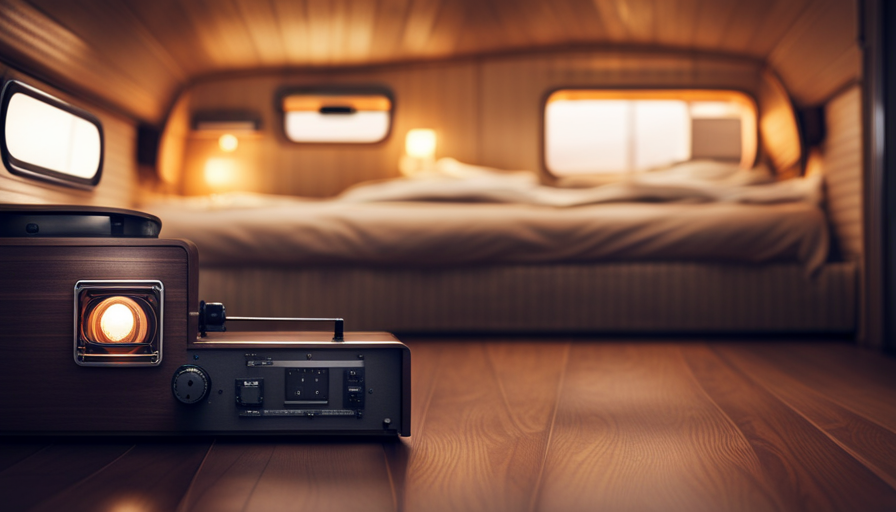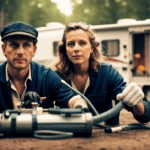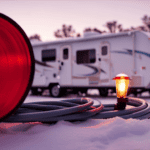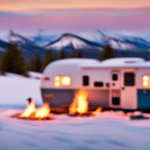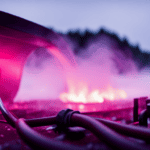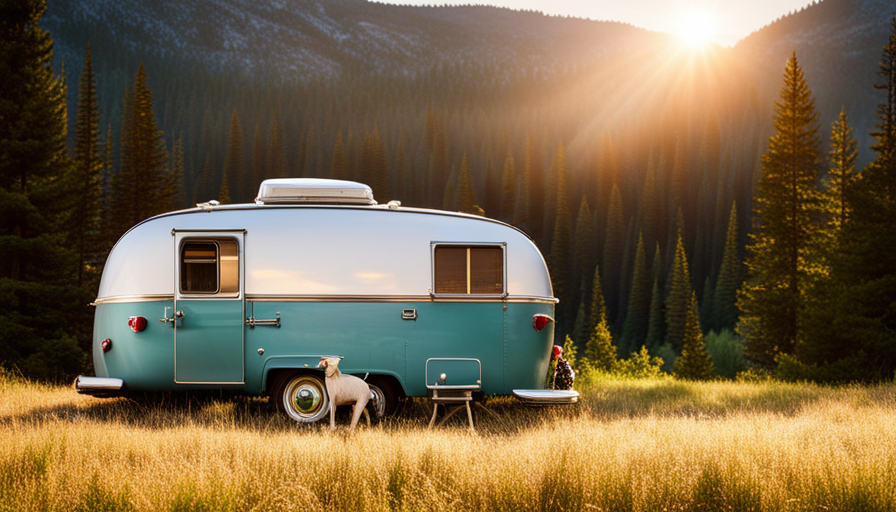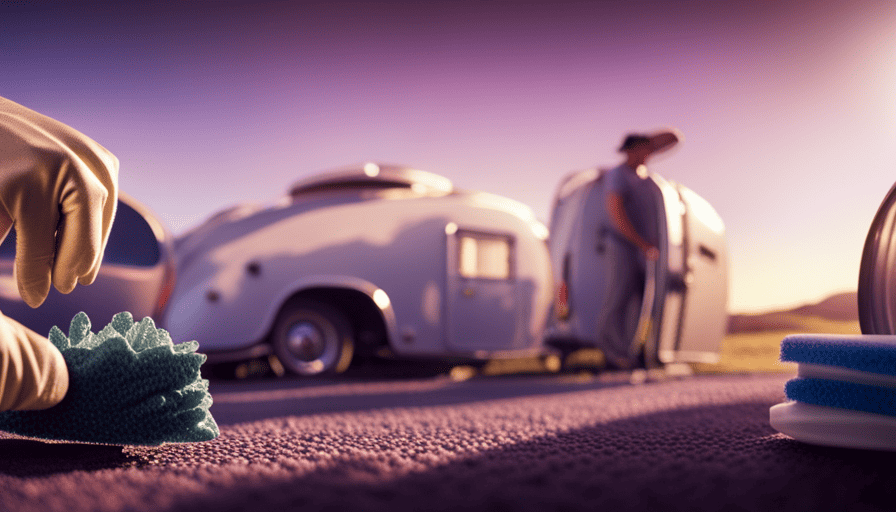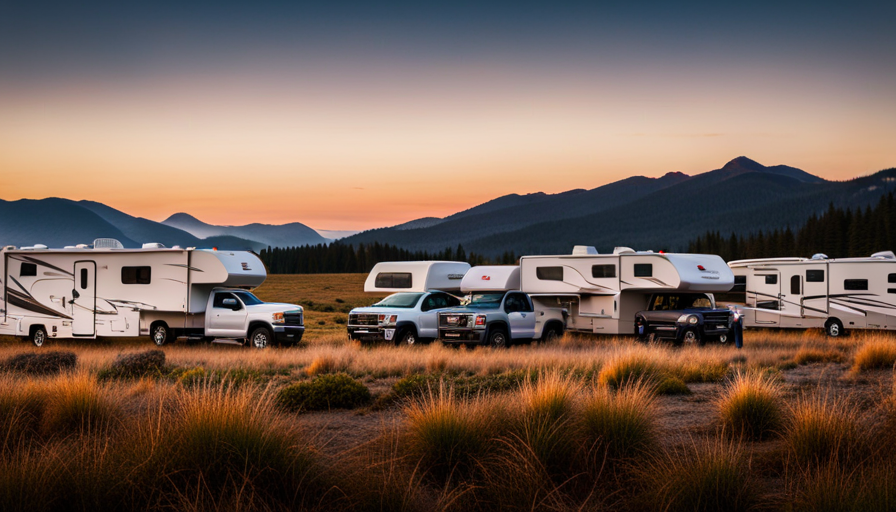As the crisp winter winds start to blow through the nation, it is no coincidence that many of us are craving a snug outdoor escapade. Whether it’s a quick weekend retreat or a longer journey, camping in a camper is the perfect way to immerse yourself in nature while still enjoying some comforts.
However, the dropping temperatures can quickly turn a dreamy excursion into a freezing nightmare. That’s where a reliable camper heater becomes an absolute necessity. But with so many options on the market, how do you choose the best one for your needs?
In this article, we will explore the various types of heaters available for campers and provide you with a comprehensive guide to selecting the perfect heater. From propane heaters to electric options and everything in between, we’ve got you covered.
So, let’s dive in and ensure your camping experience is warm, cozy, and unforgettable.
Key Takeaways
- Portable and built-in heaters are the two main types of heaters for campers.
- Propane heaters are popular for their efficiency and portability, while electric heaters are common with electrical hookups.
- Proper ventilation and safety features, such as automatic shut-off and tip-over protection, are crucial for camper heaters.
- Additional heating options for campers include alternative fuel sources, solar-powered heaters, radiant heaters, and ceramic heaters.
Types of Heaters for Campers
Looking for the best heater for your camper? Let’s explore the different types of heaters available! Some popular options for camper heaters include propane heaters, electric heaters, and diesel heaters. Each type of heater has its own set of advantages and disadvantages, so it’s important to consider your specific needs and preferences before making a decision. Additionally, in addition to finding the right heater, it’s also important to consider other winter camper insulation tips to keep your camper warm and comfortable during the colder months. Another important factor to consider when choosing a camper heater is the size and layout of your camper. Some heaters may be better suited for smaller spaces, while others may be more efficient in larger campers. It’s also important to consider the power source for the heater, as some may require a specific type of fuel or electrical connection. Finally, when preparing your camper for winter use, don’t forget to insulate the pipes and consider turning on hot water to prevent freezing during colder temperatures.
When it comes to heaters for campers, there are two main types to consider: portable and built-in heaters.
Portable heaters are a popular choice among campers due to their versatility. They can easily be moved around and used in different areas of the camper. These heaters typically run on propane or electricity and come in various sizes and styles. Some portable heaters even come with features like built-in thermostats, timers, and safety shut-off valves.
On the other hand, built-in heaters are permanently installed in the camper and are often powered by the camper’s fuel source, such as propane or diesel. These heaters are usually more efficient and can be controlled with a thermostat, providing consistent warmth throughout the camper.
Using a heater in your camper comes with several benefits. Firstly, it allows you to stay warm and comfortable during cold nights and chilly weather. It also helps to prevent condensation and keeps the interior of your camper dry. Additionally, a heater can extend your camping season by allowing you to enjoy your camper even during colder months.
Now that we’ve explored the different types of heaters available, let’s move on to considerations when choosing a heater for your camper.
Considerations When Choosing a Heater
When selecting a heater for your camper, it’s important to take into account various factors to ensure optimal performance and safety. These factors include the size of the space and the power consumption.
Did you know that according to a recent study, portable propane heaters are the most popular choice among campers due to their efficiency and portability? Propane heaters offer the convenience of easily accessible fuel, making them a practical option for camping trips.
Additionally, electric heaters are another common choice, especially when campsites provide electrical hookups. They are efficient and easy to use, but the availability of electricity may limit their usage in remote locations.
Considering the types of fuel for camper heaters, it’s essential to evaluate the energy efficiency of each option. Propane heaters have a higher energy efficiency compared to electric heaters, as propane is a highly efficient fuel. On the other hand, electric heaters may consume more power, resulting in a higher energy bill if used extensively.
When choosing a heater for your camper, it’s crucial to consider the size of the space, power consumption, and types of fuel available. Understanding the energy efficiency of different options will help you make an informed decision.
Now, let’s explore the top features to look for in a camper heater.
Top Features to Look for in a Camper Heater
One important feature to consider in a camper heater is its size and portability, allowing for easy installation and transportation. When choosing a heater for your camper, it’s essential to look for one that is compact and lightweight, as this will make it easier to move around and fit into tight spaces. Additionally, a portable heater can be easily stored when not in use, maximizing the available space in your camper.
Another crucial aspect to consider is the fuel options available. Opting for a camper heater that offers alternative fuel options can be advantageous. This gives you the flexibility to choose the most convenient and cost-effective fuel source for your camping trips. Some heaters can run on multiple fuels such as propane, butane, or even wood pellets, ensuring that you’re prepared for any situation.
Furthermore, energy efficiency is a key factor to look for in a camper heater. Choosing an energy-efficient model will not only help reduce your carbon footprint but also save you money on fuel costs. Look for heaters with high-efficiency ratings, as they’re designed to provide maximum heat output while minimizing energy consumption.
Considering these features, it’s evident that the size, portability, alternative fuel options, and energy efficiency are crucial factors to look for in a camper heater. Now, let’s delve into the best propane heaters for campers and explore their unique features and benefits.
Best Propane Heaters for Campers
If you’re in the market for a portable warmth machine for your cozy home on wheels, these propane-powered beauties are sure to keep you toasty during your camping adventures.
Propane heaters are a popular choice for campers due to their high heat output and versatility. Unlike electric heaters, propane heaters don’t require a power source, making them perfect for off-grid camping. They’re also more efficient at heating larger spaces, making them a great option for larger campers or RVs.
One of the main advantages of propane heaters is their ability to provide instant heat. With just the flip of a switch, you can have a warm and comfortable living space in no time. Propane heaters also offer precise temperature control, allowing you to adjust the heat to your desired level. Additionally, propane heaters are known for their durability and long lifespan, making them a reliable choice for campers.
However, there are a few cons to consider when it comes to propane heaters. Firstly, they require a propane fuel source, which means you’ll need to carry extra propane tanks with you on your camping trips. Additionally, propane heaters produce carbon monoxide, so it’s important to ensure proper ventilation in your camper to prevent any potential health risks.
Propane heaters are a fantastic choice for campers looking for a reliable and efficient heating option. With their high heat output, instant warmth, and precise temperature control, they’re sure to keep you cozy during your camping adventures.
Up next, let’s explore the best electric heaters for campers.
Best Electric Heaters for Campers
Get ready to experience cozy comfort on your camping trips with these electric marvels that’ll keep your camper warm and inviting. When it comes to electric heaters for campers, you have two main options: portable or wall-mounted heaters.
Portable heaters are great because they can be easily moved around your camper to provide heat wherever you need it most. They’re compact and lightweight, making them perfect for small spaces.
On the other hand, wall-mounted heaters are a more permanent option. They’re installed directly onto the wall of your camper and provide a consistent source of heat. They’re a great choice if you plan on using your camper frequently and want a heater that’s out of the way.
When looking for an electric heater for your camper, it’s important to consider energy efficiency. Look for heaters that have a high energy efficiency rating to ensure that you’re getting the most out of your electricity usage. Many electric heaters now come with energy-saving features such as programmable timers and adjustable thermostats, allowing you to customize your heating preferences and save on energy costs.
In the next section, we’ll dive into the best portable heaters for campers, which offer even more flexibility and convenience.
Best Portable Heaters for Campers
Stay cozy and warm on your camping adventures with these portable heat-emitting wonders that’ll keep your camper feeling like a toasty oasis.
When it comes to choosing the best portable heater for your camper, you have two main options: portable electric heaters and propane heaters. Portable electric heaters are a popular choice due to their convenience and ease of use. They’re generally lightweight, compact, and easy to transport. Plus, they don’t produce any fumes or require ventilation, making them a safe option for indoor use.
On the other hand, propane heaters are known for their powerful heat output and are a great option if you’re camping in extremely cold conditions. They’re fueled by propane gas, which means you’ll need to carry extra propane canisters with you.
When selecting a portable heater for your camper, it’s important to consider the size of your camper. A heater that’s too small may not be able to effectively heat the entire space, while a heater that’s too large may waste energy. Take into account the size of your camper and choose a heater with the appropriate heating capacity for optimal warmth.
Now, let’s move on to some tips for using a camper heater safely.
Tips for Using a Camper Heater Safely
When using a camper heater, it’s important to ensure proper ventilation to prevent the buildup of carbon monoxide. We should always make sure that the heater is placed at a safe distance from flammable materials to reduce the risk of fire.
Regular maintenance and inspection of the heater is also crucial to ensure its safe and efficient operation.
Proper Ventilation
Proper ventilation is essential when choosing the best heater for your camper, ensuring a safe and cozy camping experience. Ventilation plays a crucial role in maintaining air quality and preventing the buildup of harmful gases like carbon monoxide. It is important to prioritize the ventilation techniques while selecting a heater.
One effective method is to crack open a window or roof vent to allow fresh air circulation. This helps in replenishing oxygen and removing any potentially hazardous fumes. Additionally, using a carbon monoxide detector inside your camper is highly recommended for an added layer of safety.
Adequate ventilation not only promotes a healthier environment but also helps in controlling humidity levels. By ensuring proper ventilation, you create a comfortable and secure space to enjoy your camping adventures.
Moving on to the next section, let’s discuss the placement and distance from flammable materials.
Placement and Distance from Flammable Materials
Proper ventilation is crucial when using a heater in a camper, but it’s not the only factor to consider. Another important aspect is the placement and distance of the heater from flammable materials.
It is essential to ensure that the heater is positioned in a way that allows for proper heat distribution throughout the camper. Placing the heater too close to curtains, bedding, or other flammable items can pose a serious fire hazard. To maximize safety, it is recommended to keep the heater at least three feet away from any potentially flammable materials.
Additionally, it is advisable to use a heater with built-in safety features, such as automatic shut-off mechanisms and tip-over protection. By following these safety measures, you can enjoy the cozy warmth of a camper heater without compromising your safety.
Now, let’s move on to the next section about regular maintenance and inspection.
Regular Maintenance and Inspection
To make sure your heater is always running safely and efficiently, it’s important to regularly maintain and inspect it. Regular maintenance is crucial to prevent any potential issues and ensure the heater’s longevity.
Start by checking the air filters and cleaning or replacing them as necessary. Inspect the burner assembly and clean any debris or dirt buildup. Test the ignition system to ensure it’s working properly. Check the venting system for any blockages or damage that could hinder proper ventilation. Additionally, inspect the fuel lines and connections for any leaks or damage.
It’s important to follow the manufacturer’s guidelines for maintenance and inspection procedures. By regularly maintaining and inspecting your heater, you can ensure its optimal performance and reduce the risk of any safety concerns.
Transitioning into the subsequent section about additional heating options for campers, it’s important to explore other alternatives to complement your primary heater.
Additional Heating Options for Campers
Looking for additional ways to keep warm in your camper? One great option is using a portable electric heater. Imagine cozying up in your camper on a chilly winter night, sipping hot cocoa while the heater fills the air with warmth – it’s the perfect way to create a snug and comfortable camping experience.
Here are some additional heating options for campers:
-
Alternative fuel sources: If you prefer to use alternative fuel sources, there are heaters available that can run on propane or diesel. These heaters are often more efficient and can provide a steady source of heat for your camper.
-
Solar powered heaters: For those looking to go green, solar powered heaters are a fantastic option. These heaters harness the power of the sun to warm up your camper, making them not only environmentally friendly but also cost-effective in the long run.
-
Radiant heaters: Radiant heaters are designed to emit heat directly to objects and people in their vicinity, rather than heating the entire space. This makes them a great choice for campers as they provide quick and efficient warmth.
-
Ceramic heaters: Ceramic heaters are compact and portable, making them ideal for campers. They use ceramic elements to generate heat and distribute it evenly throughout the space.
In the next section, we’ll explore budget-friendly heating solutions for campers.
Budget-Friendly Heating Solutions for Campers
When it comes to finding budget-friendly heating solutions for campers, there are a few options to consider.
First, DIY heater options can be a cost-effective way to stay warm during your camping trips.
Secondhand heaters and camping gear can also be a great option, as you can often find them at a lower price.
Additionally, renting heaters for camping trips can be a convenient choice, especially if you only need them for a short period of time.
These options can help you stay warm without breaking the bank on your camping adventures.
DIY Heater Options
If you want to stay warm in your camper, a great option is to consider DIY heater options that are both effective and budget-friendly. When it comes to DIY heater safety, it’s important to prioritize fire prevention and proper ventilation.
Here are three alternative heating methods to consider:
-
Candle Heaters: These can be made by placing a few tea light candles inside a terracotta pot. The pot absorbs and radiates heat, providing a warm and cozy environment.
-
Insulated Heater: Using a metal can, fill it with rolled-up newspaper and place a small alcohol-soaked cloth on top. Light the cloth and let the alcohol burn, creating heat as it evaporates.
-
Clay Pot Heater: This DIY option involves using a clay pot, tea light candles, and a metal bread pan. By stacking the candles inside the pot and placing the pan on top, you can create a simple and effective heater.
When it comes to staying warm in your camper, DIY heater options can be a great solution. However, if you’re looking for a more reliable and long-term heating solution, consider exploring secondhand heaters and camping gear.
Secondhand Heaters and Camping Gear
Consider exploring the wide range of secondhand heaters and camping gear available to ensure you find a reliable and cost-effective solution for staying warm in your camper. Opting for secondhand gear can have numerous benefits, such as saving you money and reducing waste.
When searching for secondhand heaters, it’s important to find reliable sellers who have a good reputation and offer warranties or guarantees. Online marketplaces like eBay or Facebook Marketplace can be great places to start your search, as they often have a wide selection of used camping gear. Additionally, local thrift stores or garage sales can be treasure troves for finding affordable heaters and other camping essentials.
By investing a little time and effort into finding secondhand gear, you can enjoy a cozy and comfortable camping experience without breaking the bank.
For those who prefer to rent heaters for camping trips, let’s explore that option next.
Renting Heaters for Camping Trips
To truly enhance your camping experience, why not explore the option of renting heaters for your trips? Renting heaters can be a convenient and cost-effective choice, especially if you only go camping occasionally. Here are some advantages of renting heaters for your camping trips:
-
Flexibility: Rental options allow you to choose the type of heater that best suits your needs, whether it’s a propane heater, an electric heater, or even a wood-burning stove.
-
Cost comparison: Renting heaters gives you the opportunity to compare prices and find the most affordable option for your budget.
-
Convenience: Instead of purchasing and storing a heater, renting allows you to have a heater specifically for your camping trips without the hassle of maintenance or storage.
-
Accessibility: Many rental companies offer delivery services, making it easy to have a heater ready and waiting for you at your campsite.
-
Try before you buy: Renting heaters gives you the chance to test different models and types of heaters before making a long-term investment.
Considering these advantages, renting heaters can be a practical choice for campers. In the next section, we’ll provide our final thoughts and recommendations to help you make an informed decision.
Final Thoughts and Recommendations
In conclusion, the top choice for a camper heater is like a warm embrace on a chilly night, providing comfort and coziness throughout your outdoor adventures.
When it comes to alternative heating methods, there are a few energy-efficient options that stand out.
One of the best options is a portable propane heater. These heaters are easy to use and provide a steady source of heat. They’re also quite efficient, as propane is a highly energy-dense fuel. Additionally, propane heaters are safe to use in enclosed spaces, making them perfect for campers.
Another great option is an electric ceramic heater. These heaters are compact and lightweight, making them ideal for small spaces like a camper. They work by using electricity to heat up ceramic plates, which then radiate heat into the surrounding area. Electric ceramic heaters are also energy-efficient, as they convert almost all the energy they consume into heat.
If you’re looking for a more eco-friendly option, consider a wood-burning stove. These stoves use renewable resources, like wood, to generate heat. They’re highly efficient and can provide a cozy atmosphere inside your camper. Just make sure to properly ventilate your space when using a wood-burning stove.
Ultimately, the best heater for your camper will depend on your specific needs and preferences. Consider factors such as portability, fuel availability, and energy efficiency when making your decision. With the right heater, you’ll be able to enjoy your camping trips all year round, no matter the weather.
Frequently Asked Questions
Can I use a camper heater while sleeping?
Using a camper heater while sleeping can be dangerous if not used properly. It’s important to follow safety guidelines and ensure proper ventilation to prevent carbon monoxide poisoning. If you prefer to stay warm without a heater, there are alternative options.
Insulating your camper, using thick curtains, and investing in warm bedding can help retain heat. Additionally, using portable electric blankets or hot water bottles can provide extra warmth during cold nights.
How long does it typically take for a camper heater to warm up the entire space?
When it comes to warming up the entire space in a camper, the heating time of a camper heater can vary depending on several factors. Efficiency comparison reveals that camper heaters can warm up the space more quickly compared to other heating methods such as electric blankets or portable heaters.
Variables that impact heating time include the size of the camper, insulation, outdoor temperature, and the power output of the heater. Considering these factors ensures a cozy and efficient warming experience in your camper.
Are there any specific safety precautions I should take when using a propane heater in my camper?
When using a propane heater in a camper, it’s crucial to follow specific safety precautions. Firstly, ensure proper ventilation by opening windows or using a carbon monoxide detector.
Keep flammable materials away from the heater and never leave it unattended. Check for any gas leaks before use and never use the heater while sleeping.
Additionally, make sure to have a fire extinguisher nearby. Following these safety measures will help prevent accidents and ensure a safe camping experience.
Can I use an electric heater in my camper if I don’t have access to electricity?
If you don’t have access to electricity in your camper, using an electric heater can be challenging. However, you can use a generator to power an electric heater. Make sure to choose a generator that can handle the wattage requirements of the heater.
Alternatively, there are other heating options available for campers without electricity. Propane heaters are a popular choice as they’re portable and provide efficient heat. Wood-burning stoves and catalytic heaters are also options to consider.
Are there any recommended maintenance procedures for keeping my camper heater in good working condition?
To keep your camper heater in good working condition, it’s important to follow recommended maintenance procedures. Regularly clean or replace filters to ensure efficient airflow. Check for any loose or damaged connections and tighten or repair them as needed. Inspect the burner and ignition system for any signs of wear or damage.
Additionally, be aware of common heater problems like clogged vents or faulty thermostats, and address them promptly to prevent further damage.
Conclusion
In conclusion, finding the best heater for your camper is crucial for a comfortable and cozy camping experience. After considering the different types of heaters available, such as propane and electric, and the top features to look for, you can make an informed decision.
Remember to use your camper heater safely by following the tips provided and consider additional heating options if needed.
Don’t forget about budget-friendly solutions too!
Stay warm and happy camping!

